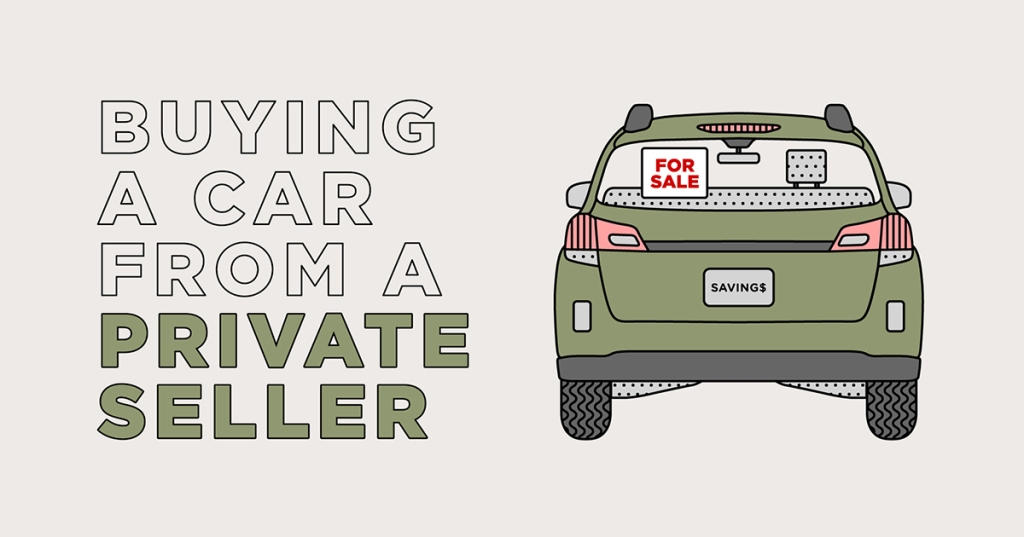
There are some important considerations to keep in mind when purchasing a vehicle from a private seller.
Cost
You often have more negotiating power when purchasing a car from an individual as opposed to a dealership. For the most part the price is set at a dealership, where a private seller, especially someone who is eager to sell, is more likely to come down on the asking price and they often want to finish the sale and move on, which means you may get a better deal. There will be no dealer fees or pushes to buy extended warranties when you buy from a private seller.
Do Your Research
Before meeting with the seller do your research, know the value of the vehicle they are selling. You can use sites like Kelly Blue Book to analyze the car. This gives you a good starting point for negotiations, it also ensures that you are not overpaying for the vehicle.
Don’t be afraid to haggle, it is your money and a lot of it. Sellers often set the price higher than they expect to get. When making an offer, start out low, never offer the asking price. From there you can negotiate until you find a price that you and the seller can agree on.
When you buy from a dealership, they research the vehicle and know its history, they use detailed vehicle history reports to gather information about the vehicle. Private sellers may not do this, so it is up to you to do that research. Use the cars VIN number to research the vehicle. The VIN number is a 17-character number that is unique to each vehicle. The VIN number allows you to lookup information about the vehicle. Different sections of the code point to the country of origin, manufacturer, brand, engine type and size, serial number and other information. You can use the VIN to check sales records, title status, and if the vehicle has been involved in an accident or flood.
You can find the VIN number near the corner where the driver’s side dashboard meets the windshield. Other possible locations are the engine block, the front of the car frame, or inside the door jamb near the driver’s seat.
There are several sites that allow you to look up a VIN number for free.
National Insurance Crime Bureau
Take a Test Drive
Always test drive the vehicle before making a purchase. This gives you a chance to see how the car handles, check for unusual noises or other problems, and ensure that you are comfortable driving it. Be sure to inspect the interior, exterior and engine, check for any signs of wear and tear, rust, or damage using a detailed checklist like this one provided by DMV.org.
If you have a friend or family member who is a mechanic, it is a good idea to let them test drive the car and check it out before you buy. If you don’t know someone personally take it to your mechanic for review. It is worth the cost to pay for an inspection before you buy. If the mechanic finds minor problems, get an estimate for the cost of repair, give it to the seller and ask if they are willing to pay for the repairs before you buy or ask to pay a lower price for the car to cover the repair costs.
Get the Details
Ask why the car is being sold.
How many previous owners has the car had?
Get the cars service history and history of repairs.
Ask about any problems the seller has had with the car.
Some states require vehicle owners to get a smog test every year to check the car’s emissions. If you live in a state where this is required ask the seller for the most recent smog test results.
Find out if the seller has the owner’s manual, spare keys, spare tires, and anything else that would have come with the car when it was originally purchased.
Comparison Shop
Before buying compare similar vehicles. Read online reviews from respected sources such as Edmunds
YouTube is a great site to learn more about the car you’re interested in.
Buy Securely and Safely
When buying a car from a private seller, it is important to obtain legal ownership of the car.
Insist on a notarized title from the seller. Never buy from a seller who offers to sell the car without one. You will also need the registration. Both should have the seller’s name on it, otherwise the vehicle is not legally theirs. Review the title carefully, look for “salvage” or “rebuilt,” which indicates that the vehicle has been totaled or needed extensive repairs in the past.
Get everything in writing, a bill of sale should include the seller’s name, your name, the price paid, the milage at the time of purchase, the date of the sale, the vehicle make and model, VIN number and any other details pertaining to the sale.
Meet the seller at the DMV to transfer the cars ownership. Don’t pay with cash, instead use a check or money order and get a written signed receipt along with the title. Don’t make the payment until the sale is final.
Watch for Scams
Scams are common in private seller vehicle sales. Do your research and be sure the seller is legitimate before making any transactions. Check their contact information and meet in a neutral location, take someone with you, never meet with a seller alone.